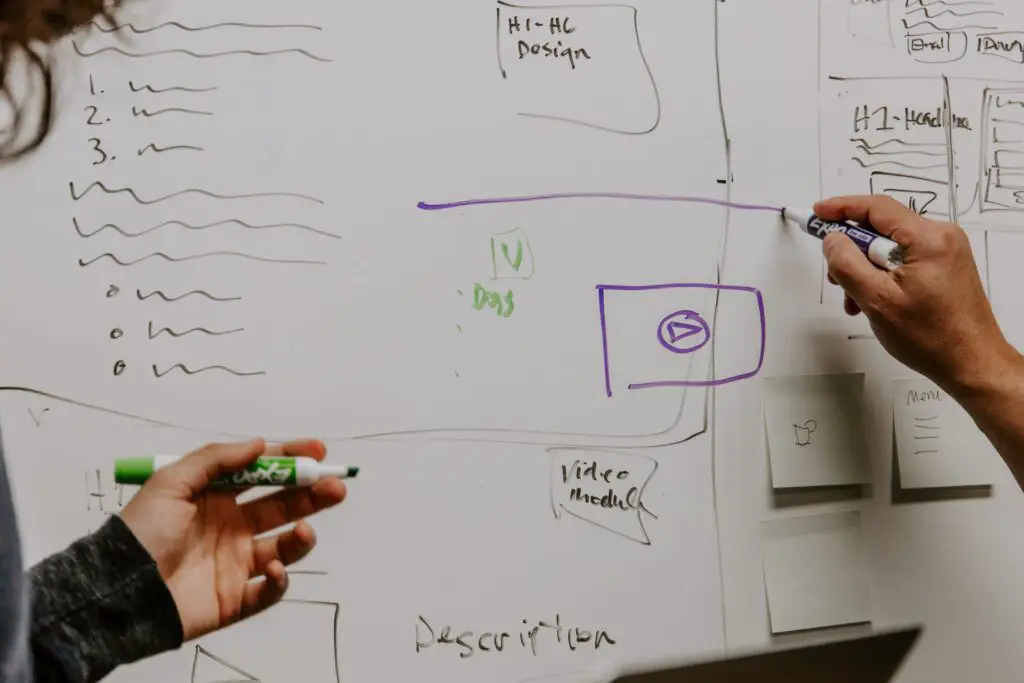There are two types of IELTS Reading Fill in the blanks questions in the test. These questions may appear as separate sentences, each with a blank. Or, there may be a paragraph or a table with words missing.
IELTS Reading Fill in the blanks without options
You have to select a word or a phrase from the text to insert into the gaps, so that the sentence thus completed is grammatically correct and makes the most sense.
The instructions before the questions tell you the word limit.
If the questions are in the form of separate sentences or bullet points, the answers can be found in the text in the same order as the questions.
Start by reading and understanding the first question. Each question has keywords which tell you what type of word or phrase to search for in the text.
Most of the times, you have to scan the passage to find the synonym of the keywords in the question.
After finding the first answer, move to the second question and so on. The next answers will always be below the last answer in the text.
Caution: If the questions are in the form of paragraphs (summary/note completion) or tables or flow-charts with missing words, then the information in the text may not be given in the same order as the questions.
IELTS Reading Fill in the blanks with options
You have to select a word or a phrase from the given options to insert into the gaps based on the information presented in the text.
You should write the correct letter corresponding to the answer (A, B, C, D) into the answer sheet.
The information in the text may not be given in the same order as the questions.
Read and understand all the questions before searching for the answers. Each question has keywords which tell you what type of word or phrase to search for in the text.
Most of the times, the correct answers from the given options are synonyms of the keywords in the passage.
Although the answers may not be present serially in the text, they will all be present in the same area of the text.
IELTS Reading Fill in the blanks practice
| Young turks’ appetite for politics |
|---|
| Long overshadowed by mainstream media and national level parliamentary politics, youth involvement in politics in Nepal has only recently become a matter of heated discussion. The reasons behind youth politics having a backstage minuscule role in bringing policy-level changes may be blamed partly to failure of youths to recognize potential of growth and opportunities here in Nepal and raise their voices and actions or their undying obsession to take a chance with third-world-dreams rooting out of different foreign ideologies. Or a failure in part of respective authorities to carve out elite manpower dedicated to bringing socioeconomic changes through ground-level local politics. Stats show the literacy rate of youths between the age group of 15-24 in Nepal is about 87 percent (UNESCO). And economically inactive population in the age group 16-25 stands at 94 percent in males and 61 percent in female youths (MoYS). They are engaged in academia but with less social and civic involvement. It can be very well argued that Nepal does have an untapped potential of youths who if aware about their roles and opportunities can play a big part in transforming the country which has long been sacrificing innovators, change-bringers and genuine politicians in the form of brain drain. Fascinatingly, there exists a generation of youths in politics though small in figures but with ample courage and leadership qualities. They are concerned youths motivated by their own will and conscience dedicated to serving society and their friends not because for attention or power but for love of their homeland. Following in the footsteps of acclaimed CPN-UML leader late Madan Bhandari, 22-year-old Sushant Sharma Banjara of Eastern Region Campus based in Dharan is a youth leader of All Nepal National Free Student Union (ANNFSU) affiliated to CPN-UML and who has already completed his term of party’s campus secretary of at an age of 20. Every leader must be able to hold a vision if nothing else; vis-a-vis that an enthusiastic student of agricultural engineering, Banjara has prioritized investment in agriculture as the only way to upscale nation’s wealth. With an ideological tilt towards reformed Marxism initiated in Nepal by late communist Leader Madan Bhandari, Banjara believes that politics is a powerful medium to institutionalize change by utilizing it as a platform which encourages innovative breakthroughs. He holds a belief that, “To wait for someone to initiate changes that matter is an extremely unwise move.” This particular belief helped Banjara to kick start his political career and made him bat eyes on issues concerning community and campus. As a youth politician his duty is to play a role of a moderator when it comes to uniting community by promoting coherence and mutual understanding through inter-cultural programs based at campus level. Banjara’s typical day starts with newspapers and ends in party level meetings focused on improving overall quality measures of the campus and addressing student issues. During his tenure at the campus, Banjara and his union brought innovative reforms to address concerns of students. For instance, they introduced an Electronic Attendance System to monitor lecturers’ presence. Many government-run campuses around our country have a common plight i.e. disinterest among teachers to run classes on a regular basis. After implementation of an attendance monitoring system, lecturers were forced to undertake designated responsibility. Not only that Banjara and his friends made authorities install a high quality WIFI service which serves as an important infrastructure particularly in engineering institutions. When asked about what he would like to change, Banjara says, “Wrong ideologies and wrong leaders have hindered our community from reaching any targeted benchmark. If the intention of a leader is transformed positively, a community can be driven to prosperity and that is where I would like to start.” However, many a time youths have been blamed for unwanted nuisances and disturbances in classes around campuses raising questions on benefits of youth involvement in party politics. As for Banjara, ineffective results are a product of high level influence and conflict of interest. If the ambitions or vested interest of a particular group is against common welfare then, according to Banjara, youths would be better off without any involvement in party politics. Out of a long list Banjara remembers educational awareness projects, library campaigns, blood donation programs and forestation program as being most effective program in the community. Sanjay Chaudhary, 20, is a college student and President of Biratnagar ward no 4 committee of Youth Association Nepal. His fascination towards leadership began all the way back during his school days when Nepal was undergoing a major political overhaul after King Gyanendra was forced to abdicate following the people’s movement of 2006. He found politics intriguing, interesting and potentially powerful. He works to promote youths and their agendas on the fabrics of mainstream politics. His work as ward president is to reach out to youths and spread awareness about how politics works in the fringes, how politics is shaping up the present and future. He holds regular seminar sessions giving youths an insight into the fray of the modern world. He organizes sporting events like football and cricket to give young eager and effervescent people a platform to showcase and manifest their talent. He organizes blood donation programs as a campaign to promote and articulate the knowledge of giving blood for the needy. When queried about the credibility of a party-based involvement of youths, he answered gracefully, “A youth has the liberty to choose, to choose willingly. A youth is not a wasted one who marches on the roads and alleys holding and waving flags. It is a core misconception ruling the conscience of the society. He expands himself, explores the multi-dimension politics has in stake. A youth who keeps himself away from politics is the one to blame for when adversity strikes and people howl for the lack of young people in the political spectrum.” One of these youths could very well be in top leadership position in the future. Watch this space! |
| This text has been adapted from an article by Bimesh Poudel published in kathmandupost.com news portal on 19 May 2016. An archive of the original article can be found at https://kathmandupost.com/miscellaneous/2016/05/19/young-turks-appetite-for-politics |
Complete the sentences below.
Choose NO MORE THAN TWO WORDS from the passage for each answer.
1 An overwhelming proportion of men between the ages of 16 and 25 in Nepal are _______________ dormant.
2 Sushant Sharma Banjara has served as the _______________ of his college’s student union.
3 According to Banjara, a country cannot become affluent unless it increases funding in _______________.
4 Electronic Attendance System has been adopted by Eastern Region Campus to check whether _______________ are present in classrooms.
5 Due to political transformations in his country, Sanjay Chaudhary first became interested in politics when he was in _______________.
Click to reveal answers »
1. economically, 2. campus secretary, 3. agriculture, 4. teachers/lecturers, 5. school
Complete the summary using the list of words, A-H below.
Write the correct letter, A-H, in boxes on your answer sheet.
Sanjay Chaudhary’s foray into youth politics
After becoming the president of a local chapter of Youth Association Nepal, Sanjay Chaudhary has arranged several 1 _______________ competitions as well as awareness program for donating 2 _______________.
Chaudhary helps young people to gain practical knowledge by conducting 3 _______________ frequently. He believes that youths taking part in political 4 _______________ in the street should not be frowned upon by the society.
| A seminars | B money | C blood |
| D misconception | E party | F demonstrations |
| G sports | H debate |
Click to reveal answers »
1. G, 2. C, 3. A, 4. F
Next lesson:
Gaurav Thapa is an experienced instructor of English as a Foreign Language. He has eight years of experience teaching IELTS and PTE.


Reading
Listening
Ripan
Can you give me more exercises similar to exercise 2? I would love to do more about it